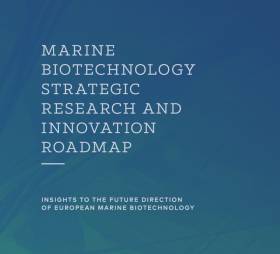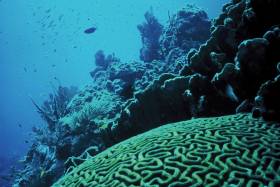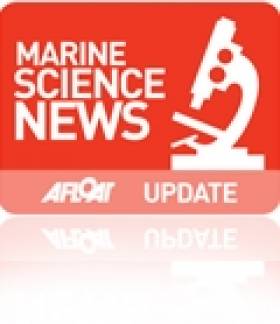Displaying items by tag: biotechnology
Kerry Marine Biotech Company Wins Award for Seaweed-Based Crop Stimulant
Marine biotech company Brandon Bioscience has won an Enterprise Ireland award for a new product that draws extracts from common brown seaweed.
The extract can be used as a crop "bio-stimulant" in fertiliser, which has the potential to reduce chemical nitrogen input on farms by up to 20 per cent.
Brandon Bioscience is working with traditional fertiliser manufacturer Target Fertilisers on the product, which won this year's overall Enterprise Ireland Innovation Arena Award.
The awards for the most innovative Irish agritech and agri-engineering products were announced today by Minister of State for Business, Employment and Retail, Damien English.
The best overall start-up award has been given to Jennifer and Kevin Corley, founders of EquiTrace which is an app that works with a horse’s microchip to identify, locate and track individual animals as they move while also recording animal temperature and health records.
The awards are normally given at the National Ploughing Championships. This year’s competition was moved online due to the cancellation of the event as a result of the pandemic.
More than 50 entries were received for this year’s contest, with 28 selected for virtual pitching, according to Enterprise Ireland.
#MarineScience - As previously highlighted on Afloat.ie, the Marine Biotechnology Research and Innovation Roadmap was launched by the EU-funded Marine Biotechnology Consortium (ERA-MBT) last week in Brussels.
The consortium brings together 19 partners from 14 countries across Europe to work with stakeholders in identifying marine biotechnological needs, and gaps in the value chain in an attempt to increase the valorisation of marine bioresources.
Developing a roadmap for future research and innovation was a key project deliverable, and it will now set the direction for future marine biotechnology developments and transnational activities in Europe.
Ireland's Marine Institute is a partner in ERA-MBT and led the development of the Marine Biotechnology Strategic Research and Innovation Roadmap. Chief executive Dr Peter Heffernan congratulated all those involved in the development of the roadmap, in particular Dr Dermot Hurst, who led the Marine Institute's contribution.
"The role played by the Marine Institute in supporting the development of Ireland's marine biotechnology research capabilities through funds awarded to the NutraMara and Beaufort Biodiscovery projects has placed Ireland in a strong international position as a recognised leader in marine biotechnology and related research,” said Dr Heffernan.
Today's bioeconomy is advancing faster and showing greater promise than ever before, driven by both scientific advances and markets demanding sustainable solutions to todays global grand challenges of food and fuel security, sustainable industry and population health.
The global market for marine biotechnology has the potential to reach €5.8 billion by 2025, and Europe is recognised as a high-potential region for future growth resulting from an extensive, yet largely unexplored marine resource.
The Marine Biotechnology Strategic Research and Innovation Roadmap, which is available to download HERE, has been developed to support the development of marine biotechnology research and innovation, enabling its growth within a self-sustained enterprise driven network. The roadmap provides a practical and realistic approach by which marine bioresources and biotechnology can contribute to economic and societal progress.
National and European policy organisations can use the roadmap in developing measures to maximise the contribution of the oceans’ bioresources to the bioeconomy and societal welfare, and funding agencies can use it to identify marine biotechnology related research themes.
Speaking from Ireland's perspective, Dr Heffernan added: "This roadmap directs attention to areas of research which are relevant to Ireland's enterprise sector and as such confirms the opportunities described by the Harnessing Our Ocean Wealth Development Task Force regarding marine resource-based industries adding value to their products and services through marine biotechnology."
Registration Open For Stakeholder Meeting On Marine Biotech Roadmap
#MarineScience - The Marine Biotechnology ERA-NET will hold a stakeholder meeting, coinciding with the launch of the recently completed European Marine Biotechnology Research and Innovation Roadmap, on 12-14 October 2016 at the Hotel Marivaux in Brussels.
The stakeholder meeting builds on the key elements of the roadmap and will feature a wide range of speakers from international industry and the research community.
This event will run from 9am to 5pm on Thursday 13 October and from 9am to 1pm on Friday 14 October and comprises six sessions:
Session 1: Marine biotechnology, an industry perspective. With the aim of stimulating innovations based on the use of marine biotechnology to explore and maximise the use of marine bio-resources, speakers from different industry sectors will describe how they use a range of novel marine materials in commercial applications.
Session 2: Creating a marine biotechnology business. The challenges of building a business venture based on marine biotechnology are the focus of this session, which includes presentations on financing a new biotechnology enabled venture, managing knowledge transfer and intellectual property in addition to case studies presented by two marine biotechnology driven high-potential SMEs providing novel products to vastly different global markets.
Session 3: Supporting marine biotechnology RTDI. Leading industry practitioners will will give their perspectives on the future opportunities to develop new research tools and infrastructure; novel processes and applications in the health, food and food ingredients sectors.
Session 4: ERA-MBT and other EU supported marine biotechnology projects. Participants will learn of the impacts and outputs from some of Europe's major publicly funded marine biotechnology research projects and hear of the progress on projects funded by the first ERA-MBT call for research proposals.
Session 5 & 6: Future research opportunities and setting priorities. Highly interactive sessions will focus on mechanisms to support marine biotechnology and set priorities for marine biotechnology research and innovation.
The launch of the Marine Biotechnology Research and Innovation Roadmap will be held on Wednesday 12 October at 4pm followed by a networking cocktail at 6pm.
The roadmap highlights research and innovation as spanning scientific, technological, economic and societal challenges and sets a marine biotechnology research and innovation agenda to 2030.
It identifies five thematic areas; the first three enable exploration of the marine environment; support biomass production and processing; and contribute to product innovation and differentiation. Two other themes, policy support and stimulation; and the provision of enabling technologies and infrastructure; provide the foundation to support growth in the Blue Bioeconomy.
National and European policy organisations can use the roadmap in developing measures to maximise the contribution of the ocean's bio-resources to the bio-economy and societal welfare, and funding agencies can use it to identify marine biotechnology related research themes.
The stakeholder meeting and roadmap launch is open for all stakeholders and can be attended for free. The number of places is limited and will be allocated on the first come, firstserved basis. Participants are required to register before Monday 26 September.
For programme details, online registration and accommodation information, see the MarineBiotech website HERE.
Eight Marine Foods & Biotecholgy Projects to Receive €4.5m
#oceanwealth – Eight marine foods and marine biotechnology related projects will receive €4.5m from the Food Institutional Research Measure (FIRM) 2013.
Dr Peter Heffernan, CEO, Marine Institute welcomed the announcement by Simon Coveney, T.D., Minister for Agriculture Food and the Marine of the successful projects to be funded by the Food Institutional Research Measure (FIRM).
"I congratulate the successful applicants - these projects are led by expert Principal Investigators who are internationally ranked in their field. Their creative scientific ability, coupled with outstanding reputations, has been instrumental in building the type of collaboration required to engage in high-level research. It brings new research expertise to the marine sector, creates focused research teams and generates new research talent. With successes as these, and following recent successes for marine foods and marine biotechnology researchers in highly competitive SFI and EU research calls, Ireland is well positioned to play a significant role in Horizon 2020 research projects."
The projects address a range of research challenges facing the marine foods sector including enhancing the quality of ready-to-eat crabs and lobster products and applying novel processing technologies to extend the shelf-life of fish. Significant amongst the projects is the focus on the use of marine bio-resources as the basis for food-health products. This includes projects that seek to exploit Ireland's seaweed resource, targeting its use as a source of prebiotic ingredients for compounds that improve brain health; and exploiting the anti-inflammatory effects of seaweed compounds on bowel disease. These projects rely on bioactive compounds extracted from seaweeds, and a related project will investigate how to optimise the chemical composition of some species of seaweed to enhance the yield of bioactives.
The funding will generate knowledge that will be accessible to Irish firms seeking to generate greater value from marine bioresources in developing food and health related products. This support for enterprise driven research activity is a direct contribution to the goals of Harnessing Our Ocean Wealth – which aim to build a thriving maritime economy based on healthy marine ecosystems.
Ireland's seafood and fisheries sectors have high-growth potential and are critically important to the Irish economy. The seafood sector currently employs 11,000 people with annual sales of €700 million, the challenge of Food Harvest 2020 is to increase revenue to €1 billion and employment to 14,000 by 2020.
The potential for marine biotechnology research to contribute to the development of new seafood products and functional ingredients is recognised in Harnessing Our Ocean Wealth – An Integrated Marine Plan for Ireland. The importance of food and health research, and sustainable food production and processing research, in enabling economic growth and job creation was highlighted in Ireland's research prioritisation exercise.
The Marine Institute has supported marine research projects to the value of €42.6m since 2007 under the Sea Change Programme, funded by the National Development Plan 2007-2013. These funds contributed to building research capabilities and have attracted new research expertise to work on marine foods related research.
Projects such as the joint Marine Institute - FIRM funded NutraMara, the national marine functional foods research programme, are delivering high quality, industry relevant outputs. NutraMara has created a solid research platform and generated new research capacity that is being used to develop functional food ingredients from marine bio-resources. The strength of NutraMara is reflected in the new FIRM awards, with five of the projects being led by NutraMara Principal Investigators.


























































